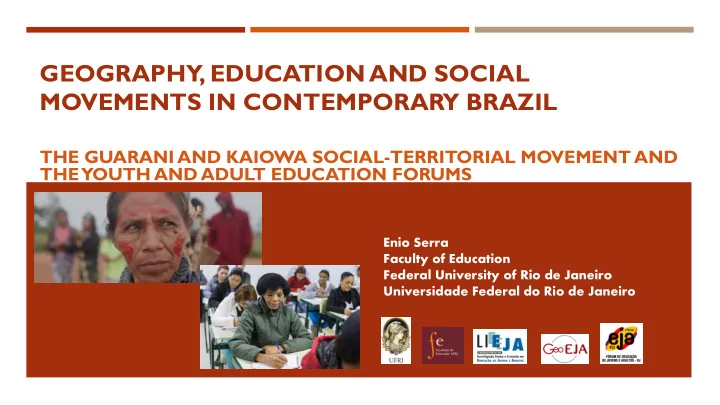

GEOGRAPHY , EDUCATION AND SOCIAL MOVEMENTS IN CONTEMPORARY BRAZIL THE GUARANI AND KAIOWA SOCIAL-TERRITORIAL MOVEMENT AND THE YOUTH AND ADULT EDUCATION FORUMS Enio Serra Faculty of Education Federal University of Rio de Janeiro Universidade Federal do Rio de Janeiro
Brazil! Show your face. I want to see who pays for you to be like this. Brazil! What is your business? Your partner’s name? Trust me. (Cazuza)
BRAZILIAN SOCIAL-SPATIAL FORMATION: BRIEF CONSIDERATIONS Colonization and territory The Bandeirantes and the massacre of the indigenous people The conquest of the territory
BRAZILIAN SOCIAL-SPATIAL FORMATION: BRIEF CONSIDERATIONS Economic archipelago The concentrated region
BRAZILIAN SOCIAL-SPATIAL FORMATION: BRIEF CONSIDERATIONS Myth of the three races Myth of foundation of Brazil and authoritarian society
BRAZILIAN SOCIAL-SPATIAL FORMATION: BRIEF CONSIDERATIONS Slavery heritage
BRAZILIAN SOCIAL-SPATIAL FORMATION: BRIEF CONSIDERATIONS Social classes in contemporary Brazil: o Former slaves “scum” (base of the social pyramid), o Low-income workers, o Middle class and its strata, o Elite.
BRAZILIAN SOCIAL-SPATIAL FORMATION: BRIEF CONSIDERATIONS Elite pact with the middle class o Moralism o Authoritarianism o Economic privileges Governments of the Workers Party (PT) and the 2016 coup d'état
GEOGRAPHY AND CONTEMPORARY SOCIAL MOVEMENTS According to Zibechi (2013), the contemporary social movements have the following aspects: o Territory as a basis o Requirement for autonomy o Enhancement of their own cultural status and defense of an identity ownership
GEOGRAPHY AND CONTEMPORARY SOCIAL MOVEMENTS According to Pedon (2013), the social-territorial movements: o Introduce new forms of land ownership and use o Entail changes in social relations and in the configuration of territories o Bound to exempted working classes o Demand of land takeover o Have territory takeover defining identities o Have Indigenous Movements, MST and MTST like instances of social-territorial movements
THE SOCIAL-TERRITORIAL MOVEMENT OF GUARANI AND KAIOWA PEOPLES Guarani e Kaiowa peoples are the second largest Brazilian indigenous ethnic groups with 43.000 people in 2012 Original Territory: Brazil, Paraguay, Argentina Currently living in indigenous reservations across the state of Mato Grosso do Sul (MS) Dourados Indigenous Reserves (MS): 3,500 ha (35 km 2 ) to 15,000 people – lock-down feeling Lack of conditions to farm for trade – they get food supplies from the federal government Lack of land is the main factor concerning the current precarious situation lived by Guarani and Kaiowa peoples
Location of Guarani and Kaiowa lands in Mato Grosso do Sul Location of Dourados Indigenous Reserve and Tekoha settlements in Dourados and Itaporã – MS
THE SOCIAL-TERRITORIAL MOVEMENT OF GUARANI AND KAIOWA PEOPLES The Guarani and Kaiowa group as an ethnical social-territorial movement in order to demarcate the boundaries of their lands To them, the territorial struggle means retaking Tekoha Tekoha : lands of traditional occupation, a place where it is possible to reproduce the Guarani and Kaiowa lifestyle Course of action: land occupation in neighboring farms (sugar cane, soy) – with settlements Agrobusiness dominance in the region Conflicts with land owners – discrimination, violence and murder Support from the CIMI – Missionary Indigenous Council
SOCIAL MOVEMENTS AND EDUCATION According to Gohn (2011): o Educational demands entail the fight for civil rights o The issues concerning civil rights make the social and economical matters and the government policies a universal theme o Emancipatory character
YOUTH AND ADULT EDUCATION FORUMS PROSPECTIVE DEMAND Youth and adult education FOR YOUTH AND ADULT EDUCATION – (EJA) as a right to those who ELEMENTARY SCHOOL did not finish Elementary school as children or teenagers In Brazil, there are 65 million people in this situation (2010 Census Figures)
Illiteracy in Brazil
YOUTH AND ADULT EDUCATION FORUMS There are EJA forums in every Brazilian state It is a social movement bound to discussing, strengthening and proposition of alternatives to Youth and Adult Education
YOUTH AND ADULT EDUCATION FORUMS Articulate partnerships and aliances to face the grave issue of illiteracy and under-schooling among youth and adults Work through monitoring public policies, financing EJA actions and demanding that the government work to tend to the people’s right to education Teachers, students, government representatives, universities, NGOs and other social movements take part
CONCLUSIONS The role of social movements in the struggle against social inequality Portray of old movement (syndicates, professional entities, students) Growth of identity movements and social-territorial movements Criminalization of social movements as conservative reaction New challenges in the current political scene in Brazil
REFERENCES GOHN, M. G. Movimentos sociais na contemporaneidade. Revista Brasileira de Educação , v. 16 n. 47 maio-ago. 2011. MIZUSAKI, M. Movimentos indígenas, geografia e marxismo na questão agrária brasileira: quando “novos” personagens entram em c ena. Revista NERA , Presidente Prudente, ano 20, nº. 39, pp. 39-59, 2017. MOTA, J.; PEREIRA, L. O movimento étnico-socioterritorial Guarani e Kaiowa em mato grosso do sul: atuação do estado, impasses e dilemas para demarcação de terras indígenas. Boletim DATALUTA , outubro de 2012. PEDON, N. Geografia e movimentos sociais : dos primeiros estudos à abordagem socioterritorial. São Paulo: Editora Unesp, 2013. SOUZA, J. A elite do atraso : da escravidão à lava jato. Rio de Janeiro: Leya, 2017. ZIBECHI, R. Palestra : Los movimientos sociales en la crisis del sistema mundo. Popayán: Maestría en Estudios Interdisciplinarios del Desarrollo. Universidad del Cauca. Colombia, 2013. Disponível em: <https://www.youtube.com/results?search_query=zibechi+movimientos+sociales>. Acesso em: 26 out. 2018.
Σας ευχαριστώ THANK YOU OBRIGADO
Recommend
More recommend